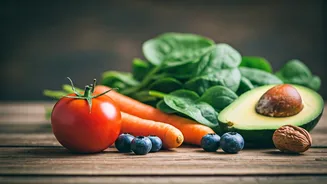Sugary Drinks
Sugary drinks, including soda and sweetened beverages, are detrimental to skin health due to their high sugar content. Excess sugar leads to glycation,
a process where sugar molecules attach to collagen and elastin, the proteins that keep skin firm and elastic. This attachment forms advanced glycation end products (AGEs), which damage these crucial proteins, resulting in wrinkles, sagging skin, and an overall aged appearance. Limiting sugary drinks and opting for water, unsweetened tea, or naturally flavored beverages is a proactive step toward maintaining youthful skin. Reducing your intake of sweetened beverages can significantly slow down glycation, thereby preserving collagen and elastin, and keeping your skin firm and healthy for a longer duration.
Processed Meats
Processed meats like bacon, sausage, and hot dogs contain high levels of sodium, preservatives, and unhealthy fats, all of which contribute to skin aging. The sodium in these meats can cause dehydration, making the skin appear dry and wrinkled. Preservatives, such as nitrates and nitrites, can trigger inflammation in the body, which accelerates the aging process. Furthermore, the saturated fats found in processed meats promote inflammation and can damage collagen, leading to a loss of skin elasticity. To support skin health, reducing the intake of processed meats and choosing lean protein sources such as fish, chicken, or plant-based proteins is advisable. This shift in diet can help minimize inflammation, maintain hydration, and preserve the skin's youthful structure.
Refined Carbohydrates
Refined carbohydrates, including white bread, pasta, and pastries, have a high glycemic index (GI), causing a rapid spike in blood sugar levels. This sugar surge contributes to the glycation process, where sugar molecules bind to collagen, impairing its function and accelerating the formation of wrinkles and sagging skin. Regularly consuming refined carbs can worsen inflammatory conditions, like acne and eczema, and further damage collagen. Replacing these with whole-grain alternatives, which have a lower GI, can stabilize blood sugar levels, reduce glycation, and enhance skin health. Opting for complex carbohydrates helps maintain collagen, leading to smoother, more youthful skin.
Artificial Trans Fats
Artificial trans fats, commonly found in processed foods, fried items, and certain baked goods, are particularly damaging to the skin. These fats trigger inflammation, making the skin more vulnerable to damage and speeding up the aging process. They also disrupt the skin's natural barrier, leading to increased dryness, and reducing its ability to retain moisture. Chronic inflammation from trans fats can impair the skin's ability to repair itself, leading to premature aging signs like wrinkles and fine lines. Avoiding foods containing trans fats is vital for preserving skin health. Regularly checking food labels and selecting products free of partially hydrogenated oils can greatly reduce trans fat intake and promote a more youthful complexion.
Alcohol Consumption
Excessive alcohol consumption can severely affect skin health. Alcohol is a diuretic, which means it causes dehydration, leading to dry, flaky skin and an exacerbated appearance of wrinkles. It also impairs the body's ability to absorb essential nutrients required for skin health, such as vitamin A, which is crucial for collagen production. Furthermore, alcohol triggers inflammation, breaking down collagen and elastin, which results in loss of skin elasticity. Limiting alcohol intake and staying hydrated by drinking plenty of water can help mitigate these adverse effects. Making conscious choices to manage alcohol consumption can support the skin's natural hydration and promote a healthier, more youthful appearance.
Salty Snacks
Salty snacks, such as chips and pretzels, contribute to skin aging through several mechanisms. High sodium content can lead to dehydration, making the skin appear dry and increasing the visibility of fine lines and wrinkles. Dehydration reduces the skin's plumpness and can exacerbate the signs of aging. Moreover, excess sodium intake may contribute to inflammation, which accelerates the breakdown of collagen and elastin, vital for maintaining skin firmness and elasticity. Being mindful of sodium intake and opting for healthier snacks, such as fresh fruits or vegetables, can help keep the skin hydrated and minimize the signs of aging. Choosing lower-sodium alternatives is a simple but effective strategy to support long-term skin health.















